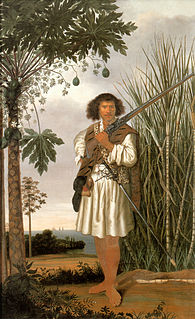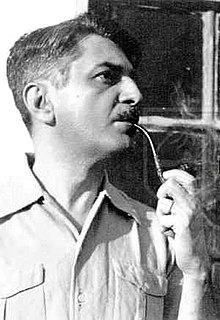
Angola is a country in southwestern Africa. The country's name derives from the Kimbundu word for king. It was first settled by San hunter-gatherer societies before the northern domains came under the rule of Bantu states such as Kongo and Ndongo. From the 15th century, Portuguese colonists began trading, and a settlement was established at Luanda during the 16th century. Portugal annexed territories in the region which were ruled as a colony from 1655, and Angola was incorporated as an overseas province of Portugal in 1951. After the Angolan War of Independence, which ended with an army mutiny and leftist coup in Lisbon, Angola's independence was achieved on November 11, 1975 through the Alvor Agreement. After independence, Angola later entered a period of civil war that lasted up until 2002.
Sranan Tongo is an English-based creole language that is spoken as a lingua franca by approximately 500,000 people in Suriname.

Queen Ana Nzinga , also known as Njinga Mbande or Ana de Sousa Nzinga Mbande, was a 17th-century queen of the Ndongo and Matamba Kingdoms of the Mbundu people in Angola. Born into the ruling family of Ndongo and Matamba, Nzinga demonstrated an aptitude for defusing political crises in her capacity as ambassador to the Portuguese, and later assumed power over the kingdoms when her brother, then king, committed suicide.

Portuguese is spoken in a number of African countries and is the official language in six African states: Angola, Mozambique, Guinea-Bissau, Cape Verde, São Tomé and Príncipe and Equatorial Guinea. There are Portuguese-speaking communities in most countries of Southern Africa, a mixture of Portuguese settlers and Angolans and Mozambicans who left their countries during the civil wars. A rough estimate has it that there are about 14 million people who use Portuguese as their sole mother tongue across Africa, but depending on the criteria applied, the number might be considerably higher, since many Africans speak Portuguese as a second language, in countries like Angola and Mozambique, where Portuguese is an official language, but also in countries like South Africa and Senegal, thanks to migrants coming from Portuguese speaking countries. Some statistics claim that there are over 30 million Portuguese speakers in the continent. Like French and English, Portuguese has become a post-colonial language in Africa and one of the working languages of the African Union (AU) and the Southern African Development Community (SADC). Portuguese co-exists in Guinea-Bissau, Cape Verde, and São Tomé and Principe with Portuguese-based creoles, and in Angola, Mozambique, and Guinea-Bissau with autochthonous African languages.

José Eduardo Agualusa Alves da Cunha is an Angolan journalist and writer of Portuguese and Brazilian descent. He studied agronomy and silviculture in Lisbon, Portugal. Currently he resides in the Island of Mozambique, working as a writer and journalist. He also has been working to establish a public library on the island.
The Battle of Kombi was a decisive battle in the war between Ndongo-Matamba and Portugal during the Dutch period of Angolan history.
Portuguese Angolan is a person of Portuguese descent born or permanently living in Angola.
The precolonial history of Angola lasted until Portugal annexed the territory as a colony in 1655.
The colonial history of Angola is usually considered to run from the appearance of the Portuguese under Diogo Cão in 1482 (Congo) or 1484 until the independence of Angola in November 1975. Settlement did not begin until Novais's establishment of São Paulo de Loanda (Luanda) in 1575, however, and the Portuguese government only formally incorporated Angola as a colony in 1655 or on May 12, 1886.
Stephen Patrick Glanvill Henighan is a Canadian novelist, short story writer, journalist and academic.

Slavery in Angola existed since the late 15th century when Portugal established contacts with the peoples living in what is the Northwest of the present country, and founded several trade posts on the coast. A number of those peoples, like the Imbangala and the Mbundu, were active slave traders for centuries. In the late 16th century, Kingdom of Portugal's explorers founded the fortified settlement of Luanda, and later on minor trade posts and forts on the Kwanza River as well as on the Atlantic coast southwards until Benguela. The main component of their trading activities consisted in a heavy involvement in the Atlantic slave trade. Slave trafficking was abolished in 1836 by the Portuguese authorities.

Loango-Angola is the name for the possessions of the Dutch West India Company in contemporary Angola and the Republic of the Congo. Notably, the name refers to the colony that was captured from the Portuguese between 1641 and 1648. Due to the distance between Luanda and Elmina, the capital of the Dutch Gold Coast, a separate administration for "Africa South" was established at Luanda during the period of the Dutch occupation.

Angola–Brazil relations refers to the historical and current bilateral relationship between Angola and Brazil.
Angolan Americans are Americans of Angolan descent or Angolan immigrants. According to estimates, by the year 2000 there were 1,642 people descended from Angolan immigrants in the United States. However, the number of Angolan Americans is difficult to determine and may be much higher as many African-Americans could be descendants of Angolan slaves. In 1644, most of the 6,900 slaves bought on the African coast to clear the forests, lay roads, build houses and public buildings, and grow food came from the established stations in Angola.
The Portuguese colony of Angola was founded in 1575 with the arrival of Paulo Dias de Novais with a hundred families of colonists and four hundred soldiers. Luanda was granted the status of city in 1605. The fortified Portuguese towns of Luanda and Benguela.

Portuguese Angola refers to Angola during the historic period when it was a territory under Portuguese rule in southwestern Africa. In the same context, it is also occasionally referred to as Portuguese West Africa.
The following is a timeline of the history of the city of Luanda, Angola.

Maria João Ganga is an Angolan film director and screenwriter, best known for being the first woman to make a full-length feature film in Angola. Her film Hollow City, which she wrote and directed was released in 2004. The film won the Special Jury Prize at the 2004 Paris Film Festival.














